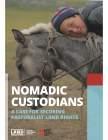Land Library
Welcome to the Land Portal Library. Explore our vast collection of open-access resources (over 74,000) including reports, journal articles, research papers, peer-reviewed publications, legal documents, videos and much more.
/ library resources
Showing items 1 through 9 of 61.The first phase of the “Water for Livestock in Isiolo and Garissa Counties, Kenya — Enhancing water resource and rangeland management community capacity through training and strategic water development” has been implemented in in the arid and semi-arid lands of Kenya by IUCN, the Kenya Red Cross
In Senegal, concern about large-scale land acquisitions has been growing since 2000. Senegalese agriculture has long relied on small-scale family holdings and extensive agriculture.
The goal of the Rangelands Initiative is increased tenure security of local rangeland users through improved implementation of enabling policy and legislation.
As part of the Global Call to Action in Indigenous and Community Land Rights, this brief puts the spotlight on the need to secure land rights for the world's pastoralists, as pastoralism is practised by an estimated 200-500 million people. Pastoralists manage rangelands that cover a quarter
The Lao Land and Forest Allocation Policy (LFAP) was intended to provide clearer property rights for swidden farmers living in mountainous areas. These lands are legally defined as “State” forests but are under various forms of customary tenure.
Over the past decade, Laos has experienced a land rush by foreign investors seeking to gain large tracts of land for hydropower, mining, and plantation projects.
The government of the Lao People’s Democratic Republic has made great efforts to halt the rapid decline in forest cover by implementing different policy measures, which include measures: to address the causes of the decline in forest cover; to sustainably manage natural forests; and to regenerate
Thirty years after Cambodia’s ‘democratization’ by the United Nations Transitional Authority (UNTAC), the transition to a market-based economy is raging at full steam.
Scholars have produced valuable insights on the question of recent “land grabbing” in the global South. They have, however, insufficiently studied the issue from below, particularly from the point of view of a crucial group in the land conundrum: the rural youth.





